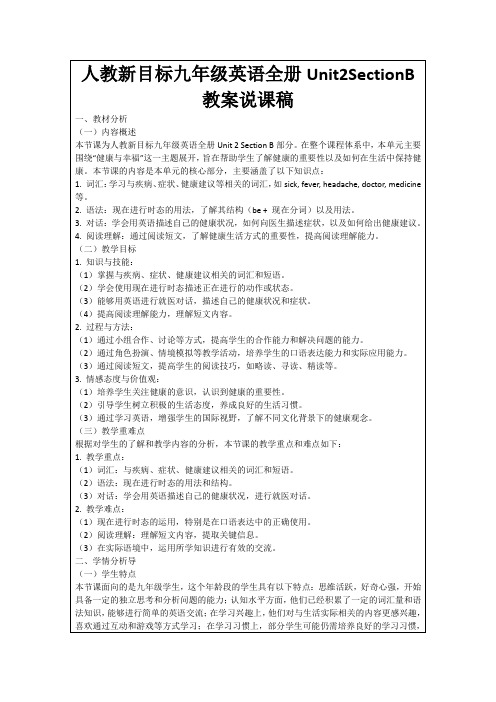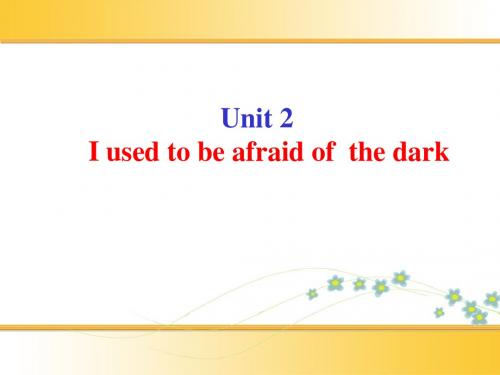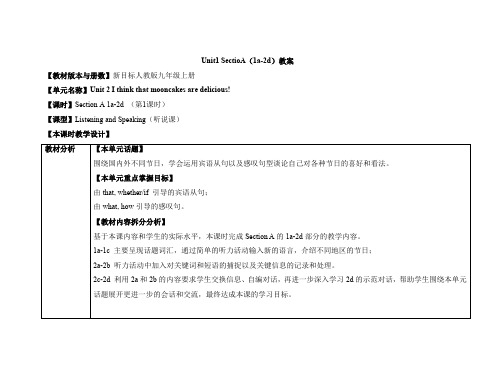新目标英语九年级Unit2全单元课件
人教新目标九年级英语全册Unit2SectionB教案说课稿

一、教材分析
பைடு நூலகம்(一)内容概述
本节课为人教新目标九年级英语全册Unit 2 Section B部分。在整个课程体系中,本单元主要围绕“健康与幸福”这一主题展开,旨在帮助学生了解健康的重要性以及如何在生活中保持健康。本节课的内容是本单元的核心部分,主要涵盖了以下知识点:
3.鼓励学生提出疑问,教师解答并提供针对性的建议,帮助他们找到提高的方法。
(五)作业布置
课后作业布置如下:
1.复习本节课的词汇和语法点,完成相关练习册上的练习。
2.撰写一篇关于健康生活的小短文,要求使用现在进行时态描述正在进行的动作。
3.观看一部英文健康主题的电影或纪录片,并记录下关键信息,下节课与同学分享。
(三)学习动机
为了激发学生的学习兴趣和动机,我将采取以下策略或活动:
1.创设生活化的教学情境,让学生在实际语境中运用所学知识,提高他们的学习兴趣和参与度。
2.设计丰富多样的教学活动,如小组合作、角色扮演、竞赛等,激发学生的学习积极性。
3.充分发挥学生的主体作用,鼓励他们提问、表达观点,并及时给予反馈和鼓励,增强他们的自信心。
(2)通过角色扮演、情境模拟等教学活动,培养学生的口语表达能力和实际应用能力。
(3)通过阅读短文,提高学生的阅读技巧,如略读、寻读、精读等。
3.情感态度与价值观:
(1)培养学生关注健康的意识,认识到健康的重要性。
(2)引导学生树立积极的生活态度,养成良好的生活习惯。
(3)通过学习英语,增强学生的国际视野,了解不同文化背景下的健康观念。
3.通过学生回答的问题,自然过渡到本节课的主题,揭示本节课的学习目标。
(二)新知讲授
Section A 2人教版新目标英语九年级Unit2全单元课件

admire sb. ____ for sth. 为某事钦佩某人 e.g. I admire him for his excellent teaching. 我钦佩他是因为他出色的教学。
根据汉语意思完成英语句子。 1) 我欣赏他的能力。 admire his ability I ___________________. 2) 张老师钦佩她的诚实。 admires her ________ for Mr. Zhang ________ her (原形→单数第三人称 形式→现在分词→过 去式→过去分词) 下(蛋);产( lay→ lays→ laying→ laid→_______ 卵); laid 放置,安放
lay out 铺开,摆开 e.g. He laid the map out on the table. 他将地图在桌子上铺开。
celebrate Mid-Autumn Festival the shape of carry… to … shoot down plan to do sth.
庆祝中秋节
……的形状 把……带给…… 射掉 计划做某事
try to do sth. refuse to do sth. fly up so… that… call out lay out
7. How he wished that Chang’e could come back! 这是一个感叹句,其中Chang’e could come back是宾语从句。
8. After this, people started the tradtion of admiring the moon… admire v. 欣赏;仰慕 admire sb. / sth. 欣赏 / 仰慕某人 / 某物 e.g. Only John admires his brother. 只有约翰欣赏他的哥哥。 I admire their hard-working spirit. 我欣赏他们努力工作的精神。
人教九年级英语上册课件:Unit 2 单元写作(共11张PPT)

【名师点评】 作文的形式是邮件,较全面地介绍了端午节,较仔细地介绍了端午节的时间、 庆祝的原因及活动。文章条理清晰,语言通顺,意义连贯,用词贴切,时态 (用一般现在时)合理。 【热点作文演练】 假如你是李易涵,你的美国笔友 Tom 向你了解中国的传统节日——春节。 现在请你用英文写一封电子邮件,向他介绍春节。内容包含时间、庆祝活动、 意义与感受等。开头和结尾已给出。
lots of happiness and fun,but we can feel relaxed.I wonder whether you like
our Chinese Spring Festival.Please write to me soon.
Yours,
Li Yihan
• 1、书籍是朋友,虽然没有热情,但是非常忠实。2022年4月19日星期二上午12时24分2秒00:24:0222.4.19 • 2、科学的灵感,决不是坐等可以等来的。如果说,科学上的发现有什么偶然的机遇的话,那么这种‘偶然的机遇’只能给那些学有素养的人,给那
Unit 2 I think that mooncakes are delicious!
单元写作
介绍最喜欢的节日及其习俗 本单元主要谈论我国的传统节日中秋节以及西方国家的圣诞节、父亲节和母 亲节,要求同学们能够了解不同国家的节日活动以及风俗习惯。 本单元常见的作文话题:介绍中国的春节、元宵节、端午节以及西方国家的 圣诞节等节日活动和风俗习惯;谈谈你在父亲节或母亲节为父亲、母亲做了 些什么,也可以谈谈你的计划与打算。
During Spring Festival,we Chinese people like wearing new sweaters
人教新目标九年级unit2课件定稿

Homework:
Write one sentence about yourself to describe the differences between past and now.
(sectionA,4---sectionB,2c)
I used to like……. I used to hate…….
bus to school.
How I’ve changed !
When you are a child, what did you use to do? And what do you do now?
Pairwork:
A: I used to eat candy all the time. Did you?
“主语+used to+动词原形+其它”。在这 个句型结构中used to的含义为“过去常 常”。表示过去的习惯,暗示现在已无此习 惯. Dave used to work in a factory. But now he works in a supermarket.
Pair work:
A:What did you use to be like? B:I used to be heavy ,but now I’m thin. ……
I. Teaching objectives 教学目标
A . Skill Focus
▲ talk about what you used to be like, including appearance and personality. ▲ talk about what you used to like (hobby) ▲ talk about what you didn’t use to like ▲ talk and write about our change ▲ use context to help learn new words and phrases
人教版英语9年级全册Unit2_SectionA(1a-2d)教案

1.学生是否能听懂目标词汇与基本句型。
2.学生是否能用目标词汇回答问题。
3.学生是否能通过听音模仿朗读课文
DELC6
3
深度加工知识
Step 4
Post-
listening(听后)
(5 mins)
Step 5
Pre --listening(听前)
(3mins)
1c Talk about the festival in 1a.
A: I guess the food was delicious, right?
Ss make their own conversations with his or her partner. Then let some pairs act out their conversations.
创编新的对话,巩固拓展学生词汇及语言能力。
The Mid-Autumn Festival
The Chinese Spring Festival
The Water Festival
教授核心句型
Ilike…best, I think that…
教授核心短语
The Lantern Festival
The Mid-Autumn Festival
The Chinese Spring Festival
friends.
3.Wu Ming visited hisrelatives/ friends/
Classmates.
4.Wu Ming liked eating out/ shopping/
The Dragon Boat Festival best.
2.Check the answers wie exercises together.
2019秋人教版九年级英语上册 Unit2全单元课件ppt

【学以致用】
①Don’t be nervous. I believe______you can make it.
A. if
B. how
C. that
D. when
②He will come back soon. I think. . . (合并为一句)
_________________________________________________
Unit 2 I think that mooncakes are
delicious!
Section A(1a—2d)
Ⅰ. 单词填写
1. relative(n. )
__________
2. pound(n. )
__________
3. 月饼(n. )
__________
4. 灯笼(n. )
__________
I wonder if/whether you will be free tomorrow. 我想知道你明天是否有空。 (2)当whether与or not连用时, whether不可换为if。 I don’t know whether or not they can come to the party. 我不知道他们是否能来参加聚会。
【学以致用】
①—I wonder______you would like to go to the concert with
me Байду номын сангаасonight.
—Oh, I’d love to.
A. when
B. that
C. if
D. why
②I don’t know______or not he should enter the race.
九年级英语 Units1-2复习课件 人教新目标版
of...as,treat...as等。 6.I'mterrified of the dark.我非常怕黑。(Unit 2) be terrified of相当于be afraid of,但语气更强,意为“非常害怕 ……;极度恐惧……”。 Don't be terrified of the difficulties. Try your best. 别怕困难,尽你的最大努力。 【拓展】 be terrified at/with 被……吓一跳 We're terrified at the bad news. 我们被那坏消息吓了一跳。 7.I go to sleep with_mybedroom_light_on.
【拓展】 ①常见的系动词有:be,feel,look,taste,smell, sound,turn (变得),become (变得)等。
②动词的过去分词形式常用来描述人的心理活动、情感。而现在分词 形式常用来描述事物的性质。
注意区分下列词的含义和用法: interested/interesting,excited/exciting,bored/boring, amazed/amazing 3.I was also afraid to speak in class... 我也害怕在班里说(英语)……(Unit 1) be afraid...害怕…… I could see in his eyes that he was afraid. 从他的眼神里,我能看出他感到害怕。 【拓展】 ①be afraid to do sth.“怕”或“不敢”去做某事 ②be afraid of doing sth.担心(出现某种不良后果)
The old man makes money by writing. 那位老人靠写作赚钱。 【拓展】 by的用法: ①在附近 ②(从旁边)经过 ③时间流逝
人教版九年级英语教学课件 Unit 2 第二单元 2课时
9 英语
年级
九年级英语上 新目标 [人]
Section A Period 2 3a-4c
the Mid-Autumn Festival
中秋节
When is the Mid-Autumn Festival?
It falls on the 15th day of the 8th lunar month,usually in September. This day was also considered as a harvest(收获) festival .
1.I heard that it is becoming more and more popular to celebrate Mother’s Day and Father’s Day in China.
◆本句是一个主从复合句,that引导的是宾语从句,作动词heard的宾语。 I heard that you passed the history test.我听说你通过了历史考 试。 ◆more and more popular表示“越来越受欢迎”,采用了“more and more + 多音节形容词”结构,表示“越来越……”,指程度不断地增大或减 小。表示“越来越……”常用的结构为“比较级+and+比较级”或“more and more+形容词/副词”。 Our city is becoming more and more beautiful.我们的城市正变得 越来越美丽。 The weather is getting warmer and warmer.天气变得越来越暖和。
as a result结果,因此,单独使用,后面接句子;as a result of 意为“由于……的原因,作为……的结果”,后面接名词(短语)、代词 或动名词。 He didn’t study hard,as a result,he failed the exam. 他学习不用功,结果没有通过考试。 As a result of light pollution,many people lost their sight.由于光污染,许多人失去了他们的视觉。
英语:Unit 2《Colour and Clothes》全单元综合课件(冀教版七年级上)
1. Here are five _a_p_p__le_. 2. Here is _a_orange. 3. This is b__lu__e__a_ chair. 4. What colour is the pen? It’sa___b_lu__e_. 5. This is _a_paper.
apples an a blue blue a piece of
How many colours do you like?
Three.
What are they?
They are red, blue, yellow, green and…
Danny! That’s
not three!
Oh!
一、选择填空
1. The green cars __C___ over there.
-What are they? -They are _th_r_e_e_b_l_u_e_c_h_a_i_rs_.
-What are they? -They are _fo_u_r__p_u_rp_l_e_p_e_n_c_il_s_.
-What are they? -They are _f_iv_e_g_r_e_e_n_e_r_a_s_er_s_.
-What are they? -They are _____________.
two yellow markers
three blue chairs
four purple pencils
five green erasers
Listen and answer:
(Before listening, give them some questions to answer.)
二、选择填空
人教版九年级英语Unit2课件及教案u2.1
Unit 2 I used to be afraid of the dark[语言目标]language goal:Talk about what you used to be like.谈论你过去的外表。
[学习目标]Functions:1. 学会陈述自己过去常做的事情2. 学会陈述自己过去的爱好等3. 能够表达自己现在和过去在外表、性格、娱乐等方面的变化4. 能够表达朋友、家人等现在和过去的变化[语言结构]Target Language:1. I used to be short when I was young. 我年轻时个子很矮。
2. —Did you use to have straight hair? 你过去是直发吗?—Y es, I did. 是的。
3. —Did you use to play the piano? 你过去弹钢琴吗?—No, I didn’t. 不,我不弹。
4. I used to be afraid of dark..我过去害怕黑暗。
5. I’m terrified of the snakes. 我害怕蛇。
6. —Did you use to be afraid of being alone? 你过去害怕独自一人呆着吗?—Y es, I did. 是的,我怕。
7. I used to walk to school. 我过去走着上学。
[主要词汇]V ocabulary:dark 黑暗sure 无疑,确实terrify 使害怕,使恐惧on 接通的,工作着的spider 蜘蛛insect 昆虫chew 嚼,咀嚼gum 口香糖right 立即,马上comic 连环漫画hardly 不十分,简直没有used to do sth. 过去经常be interested in 对…感兴趣be on the swim team 是游泳队成员be afraid of 害怕be terrified of 害怕with the light on 灯开着做…worry about 担心chew gum 嚼口香糖these days 目前,如今not…anymore 不再[词汇复习]recycling:short hair 短发curly hair 卷发long hair 长发straight hair 直发tall 高的short 矮的(be)medium height 中等身高thin 瘦的heavy 重的,沉的(have/has) a medium build 中等胖瘦[语法分析]一、本单元语法重点内容是used to这个句型。
- 1、下载文档前请自行甄别文档内容的完整性,平台不提供额外的编辑、内容补充、找答案等附加服务。
- 2、"仅部分预览"的文档,不可在线预览部分如存在完整性等问题,可反馈申请退款(可完整预览的文档不适用该条件!)。
- 3、如文档侵犯您的权益,请联系客服反馈,我们会尽快为您处理(人工客服工作时间:9:00-18:30)。
wear(s) glasses/clothes …
He was short when he was a child, but he is tall now.
He used to be short, but now he is tall.
quiet …
outgoing …
She used to be …, but now she is … .
used to do sth 的几种形式 陈述句: I used to be short . 否定句: I didn’t use to be short .
一般疑问句:Did you use to be short ? Yes , I did . No, I didn’t .
be/get used to doing sth .习惯于做某事
Bob hasn’t seen his friends for four years. What did his friends use to look like?
1. Mario used to be __s_h_o_r_t__. He used to wear _g_l_a_s_s_e_s_. contact lenses (隐形眼镜)
Section A 1a-2c
tall medium height
big eyes straight hair
heavy wear glasses
thin short hair brown hair
active funny
smart friendly
outgoing serious shy quiet
height
tall medium height short
long hair short hair straight hair
build
heavy
hair
medie/has (big) eyes,
curly hair blonde hair brown hair ……
2. Amy used to be ___t_a_l_l __. She used to have __s_h_o_r__t_h__a_i_r_.
3. Tina used to have ___r_e_d_____ and ___c_u__r_ly___ hair.
Suppose you meet your old friend at the street.
Listen again. Fill in the blanks with the words you hear.
Paula: Hey, Steve! Over here! Don’t you remember me? Steve: Oh, wow! You’re Paula, aren’t you? Paula: That’s right.
A: Hi, are you…? B: Yeah. I’m … . I haven’t seen you
for years. A: Did you use to be/have/wear … ? B: Yes, I did. / No, I didn’t. A: You used to be/have/wear…, didn’t
You used to be quiet, didn’t you?你以前很静的,
是不是?
反意疑问句: 陈述句, 动词+主语?
肯定/否定 否定/肯定
练习: He is a student, ___i_s_n__’t__h__e____?
He/She used to be/have/wear…, but now he/she is/has/wears ….
He _u_s_e_d_t_o_p_la_y__b_a_sk_e_t_b_a_ll_ in the
free time, but now he is interested
in _p_la_y_i_n_g_f_oo_t_b_a_ll_.
Steve: But you used to be really__q__u_i_e__t__, didn’t you? Paula: Yeah. I wasn’t very _o__u_t_g__o_i_n__g_. Steve: No, you weren’t. But you were always _f_r_ie__n_d__l_y_. Wait
Sum up Sum up
You used to be short.
I used to be really quiet.
She used to have long hair.
He used to wear glasses. used to + 动词原形
表示过去经常、以前常常, 只用于过去式中, 用来表示现在已不存在的习惯或状态。
a minute! Did you use to play the piano?
Paula: Yes, I did. But now I’m more interested in _s_p_o__r_t_s. I
play soccer and I’m on the swim team. Steve: Wow! People sure change.
Who has changed most ?
Past
Now
Hair
Height
Build
personality
Hobby/habit
Report:
People sure change! We make a survey about the changes and we found … changed most. He/she used to … … but now he/she … …
you? B: Yes, I did. / No, I didn’t.
Listen and check √( ) the words you hear.
_____shy
______ serious
__√___friendly ______ funny __√___ outgoing ___√__ quiet
